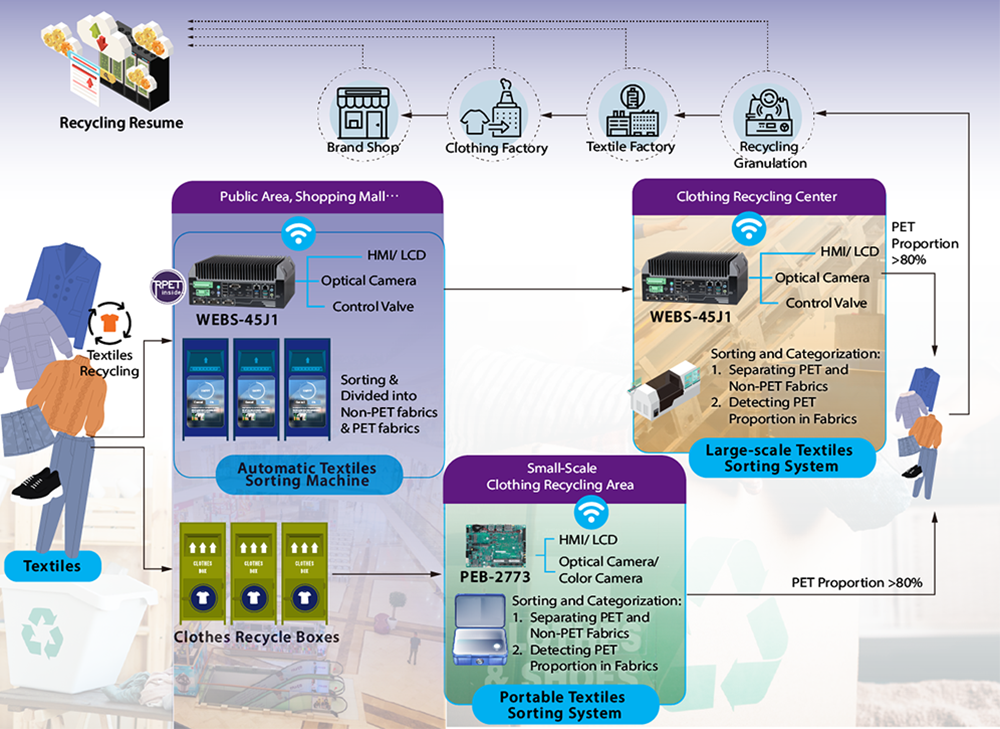
Industry: Textile
Country: Taiwan
With growing environmental awareness and resource challenges, textile recycling has become vital to the green economy. Efficient sorting of discarded clothes enables resource reuse, reduces waste and lowers pollution, driving sustainable development. Due to the diverse textile materials involved in clothes production, traditional manual sorting struggles to accurately identify material types, creating significant obstacles in recycling and reuse. Historically, discarded clothes has primarily been sorted manually into two categories: 1.Usable garments, sold as second-hand clothes in regions like the Middle East and Africa. 2. Damaged or lower-quality garments, which are difficult to decompose or recycle and are typically incinerated.
One of the major challenges faced by modern textile recyclers is efficiently sorting recyclable materials, such as PET (polyester), from multi-material textile structures. Traditional manual sorting is inefficient, error-prone, and economically unsustainable. By adopting automated sorting technology, textile recyclers can overcome these challenges, reduce labor costs and improve recycling efficiency.
Smart textile material sorting leverages NIRs (Near-Infrared Spectroscopy) technology to identify the chemical composition of textiles, whether through portable handheld systems or large-scale sorting equipment. Accurate classification relies on building a specialized textile fiber database and AI algorithms. Large-scale sorting equipment, for example, can identify various textile materials like polyester, cotton, and nylon within 1-3 seconds, converting discarded clothing into reusable textile materials. This provides reliable support for chemical fiber and textile manufacturers in recycling processes.
Currently, PADE sustainable solutions uses PET materials identified through its system to produce industrial-grade plastic sheets from recycled clothes. Their next step involves decolorization treatment for upgrading the recycled materials into textile-grade yarn, achieving a full recycling loop from old clothes to new garments.
Portwell provides PADE sustainable solutions with three tailored solutions across different scenarios: portable handheld sorting systems, automated recycling bins, and large-scale sorting equipment. These systems feature wide temperature support and flexible expansion capabilities to ensure efficient and stable sorting performance.
Equipped with Intel® Core™ i3/i5/i7/i9 processors, the fanless design offers excellent thermal management, supporting a wide operating temperature range from -20°C to 60°C for long-term operation in harsh environments. It features diverse I/O interfaces (e.g., USB 3.2, serial ports, video interfaces) for seamless integration with image sensors and optical inspection devices. Dual-display output enables visualized monitoring and operations.
Powered by the Intel Atom® platform, it delivers high performance with low power consumption, which is ideal for mobile inspection scenarios requiring long-term operation. Its compact design suits space-constrained applications and features multiple I/O interfaces (e.g., USB and serial ports). With support for operating temperatures from -20°C to 60°C, it ensures stability and reliability.
For large-scale sorting equipment, the system can incorporate AI acceleration modules of varying processing power to enhance image processing speed. Additionally, the system supports multiple wireless transmission module slots for real-time remote monitoring and data collection, helping PADE sustainable solutions digitize and trace recycling actions. The Portwell Remote Monitoring Solution (RPET) enables real-time system monitoring, fault alerts, and maintenance optimization, enhancing efficiency and reducing costs and downtime.
Portwell is committed to driving the global sustainability transition, offering advanced technical solutions for textile recycling and sorting systems. By fully supporting and promoting the circular economy, Portwell aims to become the ideal technical partner for enterprises pursuing ESG goals, creating a sustainable value chain.